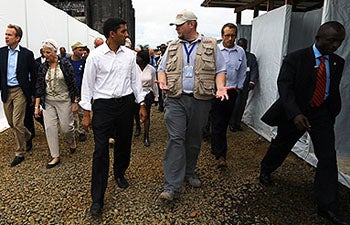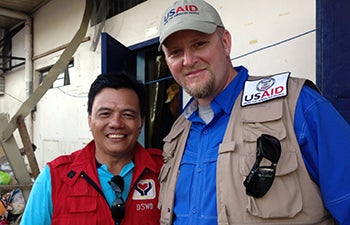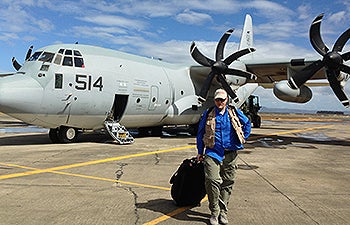When Disaster Strikes
Explaining to anguished parents why they could not hold their dead children and kiss them one last time before putting them in the ground was one of many tough challenges humanitarian aid workers faced during the recent Ebola crisis in Liberia — the country hardest hit by the deadly virus.
USC Dornsife alumnus and former U.S. Marine Ben Hemingway, who led the U.S. response to Ebola in the West African nation, is still haunted by such memories.
“The challenge of the Ebola response was more to protect the living than heal the sick,” Hemingway said. “There was very little you could do for the sick early on.”
Persuading people to relinquish cherished traditions to conduct life-saving safe burials was a key step in reducing infection. “As in the West, Liberians wash the bodies of their deceased and prepare them for open casket funerals,” Hemingway said. “People come and touch the diseased body and this was where much of the propagation of the virus occurred, particularly in the early days.”
As USAID’s regional adviser for East Asia/Pacific at the Office of U.S. Foreign Disaster Assistance, Hemingway has carved out a career as one of the government’s most experienced disaster response experts.

Ben Hemingway (in cap) with USAID administrator Raj Shah in Liberia.
Hemingway credits the broad-based liberal arts education he received as an international relations major at USC Dornsife with giving him the skills to succeed in his career.
“My experience at USC Dornsife taught me how to navigate completely different worlds and vocabularies and gave me a firm foundation to bring together experts from different backgrounds to address a common challenge,” he said.
Implementing safe burials was one among many challenges Hemingway faced during a recent two-month rotation in Liberia as second in command of the U.S. Agency for International Development’s (USAID) Disaster Assistance Response Team, the federal agency coordinating the U.S. response to Ebola in Liberia. Another was creating sufficient numbers of treatment centers.
Heading the response team was particularly challenging, Hemingway said, because it was the first time the world had to confront an Ebola outbreak of this scale and complexity, not only in West Africa, but in an urban environment where there is already a striking lack of healthcare.
“There had been small outbreaks in the past, but they typically burned themselves out because the disease is so virulent that people tended to die before they could spread it very far. But in an urban setting we saw logarithmic levels of reproduction this summer, suggesting it would be very difficult to bring the outbreak under control — if indeed it even was possible to bring it under control.
“When we went into Liberia there was no rulebook, there was no playbook. We had to bring together all this disparate technical expertise and come up with not only a medical plan to address the outbreak, but we had to incorporate policy changes, conduct public outreach and address security issues. And we had to do it fast.”
Describing Liberia as “a nightmare case,” Hemingway admits there were times he despaired of beating the virus.
“The numbers and projections were so grim, if we didn’t take radical action, it was going to be uncontrollable. At one point, projections showed 1.4 million people could be infected. You just can’t put in enough treatment units to care for all these people. We had to come at this thing from all different angles, not only changes in healthcare and Ebola care provision but social behavior changes, too.”
In October and November, Hemingway’s efforts began to show results as the number of deaths and new cases of Ebola began to diminish significantly.
The lessons Hemingway and his team learned from their early trials are now being used in Sierra Leone, Mali and Guinea to end outbreaks there. Hemingway hopes his work to bring about clinical trials on Ebola vaccines will speed breakthroughs.
“If this outbreak had not occurred and had it not been such a global challenge, we probably wouldn’t have seen such expedited vaccine trials. As a result, next year we may see a viable Ebola vaccine so we never see an outbreak like this again.”

Ben Hemingway (right) credits USC Dornsife with enabling him to work successfully with people from widely varying backgrounds. Here, he is pictured with Camilo Gudmalin, assistant secretary at The Philippines Department of Social Welfare and Development.
Service comes naturally to Hemingway who joined the U.S. Marines after graduating from high school in 1993.
The oldest of five children, Hemingway grew up in Detroit, Michigan, later attending high school outside Toledo, Ohio.
“As a first-generation college student, it never occurred to me that higher education was an option for me,” Hemingway said.
His thirst for adventure and desire to travel drew him to an Armed Forces recruitment center. First, he approached a U.S. Air Force recruiter, who told him, “Sign up, you’ll love it,” Hemingway recalled.
“Then I walked down the hallway to the U.S. Marines recruiter. He said, ‘Go away, you’re not tough enough, you’ll never make it in the Marine Corps.’ And I said, ‘Okay, this is what I want to do, I want to be a Marine.”
After four years in the Marines, Hemingway joined the tech sector in San Diego, working for Qualcomm. However, this promising start was torpedoed by the Asian financial crisis, which resulted in massive layoffs.
“I was 21 years old with a young child,” Hemingway said. “I knew I had to do something better with my life and find a more reliable future.”

Based in Bangkok, Thailand, troubleshooter Ben Hemingway hits the tarmac running as a leader of the government’s response to disasters and health crises worldwide.
After a stint at San Diego City College, Hemingway’s mentor, Jack Willis, a former Trojan defensive end and longtime professor of economics at the college, encouraged him to apply to USC.
“I thought I couldn’t afford it. For a first-generation college student like me, such an esteemed institution seemed out of reach. But I applied and was lucky enough to be given nearly a full ride on a need-based scholarship.
“Thanks to this opportunity that USC provided me, 15 years later I’m hopeful to continue the Trojan Family tradition with my son applying as a freshman in the Fall of 2015.”
Hemingway said he chose international relations because of the opportunity USC Dornsife provides to study across disparate disciplines.
“I studied subjects from philosophy to theatre, cinema and photography. I barely knew these subjects existed, let alone that they could be career options. That inspired a passion to bring those different elements into the work I do.”
Hemingway earned a master’s degree in international security from Georgetown University in Washington, D.C., in 2003. Since then, he has spent about 12 years working with NGOs throughout the world, primarily on international development and humanitarian relief.
Based in Bangkok, Thailand, where he lives with his two sons, Hemingway is among a small, elite cadre of fewer than 50 operatives who respond to worldwide disasters on behalf of the U.S. government.
“Basically, I’ve worked on just about everything that’s made front page news over the past 10 to 15 years from Afghanistan, Iraq, Yemen, Darfur and Congo,” Hemingway said.
Last year, Hemingway led the response to Typhoon Haiyan, the strongest storm in human history, in which 7,000 people died. Nearly a year to the day later, in early December 2014, he found himself responding to another storm, Typhoon Hagupit, in the Philippines. Throughout his area of responsibility in the Asia Pacific region, he responds to an average of 12 to 15 small and medium scale disasters each year.
He also troubleshoots worldwide. “We serve where we are called on to serve, whether it’s insurgency in Iraq, an Ebola outbreak in Liberia, or civil unrest in the Central African Republic,” Hemingway said. “It’s like being a firefighter, things pop up and we are called on to deal with them.”